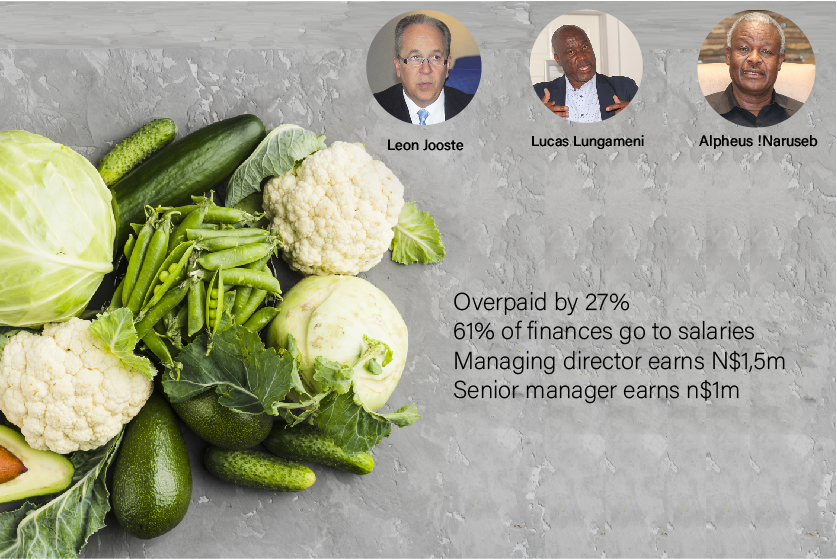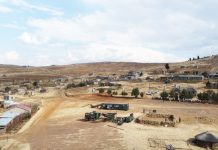By Shinovene Immanuel | 18 January 2019
The government formed Amta in 2013 to facilitate the marketing and trading of agricultural produce, and to promote food security in Namibia.
The parastatal operated fresh produce hubs in Windhoek, at Ongwediva and Rundu, but the entity turned out to be a cash-cow for a few business people.
Jooste wrote a letter to agriculture minister Alpheus !Naruseb on 18 December 2018 titled “Amta remuneration levels of the managing director and the senior managers from 2013 to November 2018”.
Both Jooste and !Naruseb confirmed the letter, but declined to comment further.
“I don’t want to comment on the matter until we are finished with our internal process. We are in the process of finding the way forward,” !Naruseb told The Namibian yesterday.
Jooste’s letter was a response to another sent to him by !Naruseb.
“For the past five years, the annual salary increases implemented by Amta were above the inflation rate, which have resulted in an average of a 27% variance above the 90th percentile of the gazetted remuneration directive,” Jooste stated. Amta has four senior managers, excluding the managing director. They were five, but Fidelis Mwazi resigned after he became the Agronomic Board of Namibia’s chief executive last year.
The Namibian understands that Amta’s managing director, Lucas Lungameni, earns N$1,5 million per year, while senior managers earn more than N$1 million annually.
Public enterprises’ regulations state that Lugameni should not earn more than N$1,3 million, while senior managers should not earn over N$1 million.
Jooste said his office does not have records of any exemption granted for Amta “to pay the chief executive and senior management above the gazetted remuneration directive”.
“The non-compliance is a very serious concern,” he stressed.
The minister said although the 2017 audited financial statements indicate that there has been an increase in income and a cash surplus for Amta, it was mainly attributed to government grants.
“The total salary bill [of Amta] is at 61% of the total expenditure, and it is not sustainable, taking into consideration the government grant risk factor,” Jooste explained.
The current workforce could not be confirmed, but Namibian Sun reported in 2017 that Amta’s staff increased from 126 to 168 workers, which resulted in the wage bill increasing by N$30 million – from N$33 million to N$63 million.
With the current financial problems faced by the government, state grants may be reduced, and Amta’s sustainability could be under threat.
Jooste said he knows that labour laws do not allow an employer to unilaterally change the employment conditions of workers, but given the seriousness of the non-compliance with the law and the state remuneration directive, action should be taken.
He made several recommendations, including directing the Amta managing director to provide proof that these annual increments since 2015 were indeed approved by the board.
“If the increments were not approved, the board must be requested to inform management to reserve the salary for what was approved, and appropriate actions should be taken,” Jooste continued.
If the increments were approved, the board must be requested to apply for an exemption from the public enterprises ministry through the agriculture minister.
“The current remuneration levels for the chief executive officer and senior management should be aligned to the gazetted remuneration directive to ensure compliance,” he said, adding that Amta should immediately freeze salary adjustments for the managing director and senior management until the ongoing public enterprises reforms in Namibia are done.
He said the board should also consider restructuring Amta because its salaries are not sustainable, adding that “a performance management system (should) be implemented, and annual performance incentives be awarded, based on the achievement of agreed KPI’s [key performance indicators] and the board’s discretion”.
Amta boss Lungameni declined to comment since he has not been informed about the matter.
Sources familiar with Amta affairs said the management contracted a company called EasyHR in 2014 to re-evaluate the positions and salaries. This was a year after the company started operating.
The results included paying the managing director around N$1,3 million per year.
According to sources, the report also recommended that senior managers be paid an annual salary of N$900 000. This was almost double what those positions fetched in 2014 with N$332 800 to N$432 800 per year. The company, according to the Namibian Sun report, made losses of N$120 million between 2014 and 2016.
Amta relies on government bailouts. Budget documents show that Amta will have received N$45 million from 2018 to 2021.
PRIVATE BENEFITS
Amta has been in the news for all the wrong reasons since 2017.
The Namibian reported how Amta overpaid by N$27 million when it bought a N$40 million property in Windhoek from businessman Erastus ‘Chicco’ Shapumba.
Last month, the paper reported that Amta had been paying over N$140 000 per month to Shapumba since 2015 for renting an unused property at Oshikango.
The businessman denied any wrongdoing, and insisted that Amta should be thankful to him.
Amta did not only pay for dodgy land deals, but the company also surrendered its core mandate when it recruited Fysal Brenner from Fysal Fresh Produce to buy products from various producers in Namibia as well as the SADC region, and to transact 120 metric tonnes of produce per month for the Ongwediva fresh produce hub.
This meant that Amta, which was supposed to create sustainable, community-driven agricultural development which reduces poverty and creates sustainable markets linked to rural economies, will provide only 44% of products to that hub.






